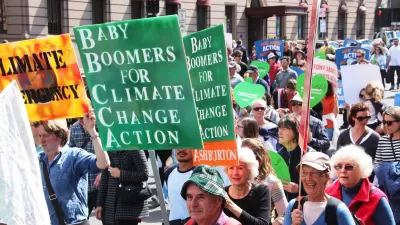A forthcoming study, to be published by the Journal of Regional Science, finds the urban preferences of younger generations growing over the past three decades.

Richard Florida reports: "A new peer-reviewed study (the article is forthcoming in the Journal of Regional Science) finds that not only have young people been a driving force in the urban resurgence of the past two decades, but they favor living in central urban neighborhoods significantly more than previous generations did at the same stages in life."
Yongsung Lee of the Georgia Institute of Technology and Bumsoo Lee and Md Tanvir Hossain Shubho of the University of Illinois at Urbana-Champaign authored the study.
Over the past three decades, each successive cohort of young adults in the United States has become progressively more urban. "Young adults aged 25-34 have indeed been key movers in the urban revival. But the shift precedes Millennials; it actually began with Gen Xers back in the 1990s. And the youngest cohort, aged 20-24, is the most urban of all. American adults aged 20 to 34 are much more urban, and much less suburban, than the Baby Boomers," according to Florida's explanation of the study's findings.
FULL STORY: Young People’s Love of Cities Isn’t a Passing Fad

Maui's Vacation Rental Debate Turns Ugly
Verbal attacks, misinformation campaigns and fistfights plague a high-stakes debate to convert thousands of vacation rentals into long-term housing.

Planetizen Federal Action Tracker
A weekly monitor of how Trump’s orders and actions are impacting planners and planning in America.

In Urban Planning, AI Prompting Could be the New Design Thinking
Creativity has long been key to great urban design. What if we see AI as our new creative partner?

King County Supportive Housing Program Offers Hope for Unhoused Residents
The county is taking a ‘Housing First’ approach that prioritizes getting people into housing, then offering wraparound supportive services.

Researchers Use AI to Get Clearer Picture of US Housing
Analysts are using artificial intelligence to supercharge their research by allowing them to comb through data faster. Though these AI tools can be error prone, they save time and housing researchers are optimistic about the future.

Making Shared Micromobility More Inclusive
Cities and shared mobility system operators can do more to include people with disabilities in planning and operations, per a new report.
Urban Design for Planners 1: Software Tools
This six-course series explores essential urban design concepts using open source software and equips planners with the tools they need to participate fully in the urban design process.
Planning for Universal Design
Learn the tools for implementing Universal Design in planning regulations.
planning NEXT
Appalachian Highlands Housing Partners
Mpact (founded as Rail~Volution)
City of Camden Redevelopment Agency
City of Astoria
City of Portland
City of Laramie




























